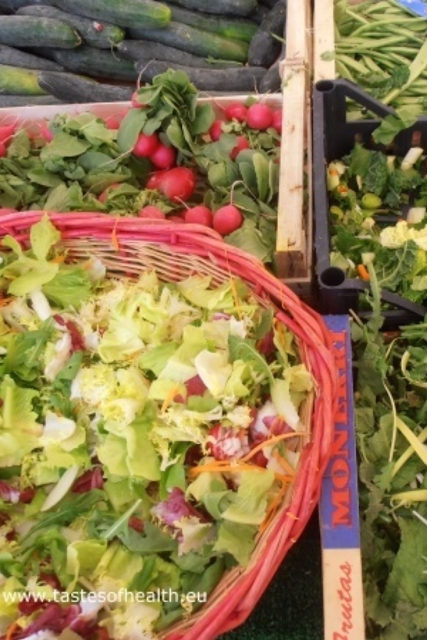Although there is no bad food there are only bad diets, some
types of food are better for us than other types.
Our diet should be rich in nutrient dense food because it provides
us with all sorts of goodness (nutrients) without the bad stuff (fat, added sugar)
and only with a small amount of calories. But we have to be careful not to
“spoil” the nutrient dense food by preparing it with added sugar or solid fats.
For example 85g of chicken breast has 138 kcal if baked but 246 kcal if breaded
and fried (Dietary Guidelines for Americans 2010).
If you would like to check how nutrient dense your favourite
ingredients are, please follow this link but here, straight away there is a short list of food we should eat more:
- Vegetables (especially dark green vegetables which are on top of the list of nutrient dense food, but also red and orange ones as well as peas and beans),
- Fruit,
- Whole grains (they should amount to at least 50% of all grains intake),
- Fat-free or low-fat dairy products,
- Wide range of low calorie and low fat proteins (not only meat that should really be replaced by fish, but also legumes, nuts, soy products),
- Oils (instead of solid fats).
Energy dense food is the complete opposite: it has very few
nutrients but lots of calories often referred to as empty calories. I am afraid
majority of us know exactly which products belong to this group: the ones we do
enjoy tremendously but as soon as we finish them we feel guilty we had them....
So we should eat (much) less of them and at the same time we should reduce
consumption of the following (DGA 2010):
- Sodium < 2300mg/day (preferably even < 1500mg/day) – that means approximately 1 teaspoon of salt per day (or even less than 0.5 teaspoon in the second case),
- Saturated fatty acids < 10% of total daily calorie intake,
- Cholesterol < 300mg/day,
- Trans fatty acids (hydrogenated fats) as low as possible,
- Refined grains,
- Solid fats and added sugar (SoFAS) < 5-15% of the total daily calorie intake,
- Alcohol.
I know from my own experience it is not easy to quit old
habits and wonderful tastes that – unfortunately - fat and sugar give to meals
but don’t we deserve to look after ourselves? Besides with a wide range of
products that are good for us and should be eaten, we can get creative and make
delicious but healthier meals.
And lastly - as I wrote at the beginning of this
post - there is no bad food there are only bad diets, so if we are really
desperate to have a lemon meringue roulade (or something equally sinful), let’s
have it, it will be OK. It will be OK as long as we don’t have it every day.


0 коментара:
Post a Comment